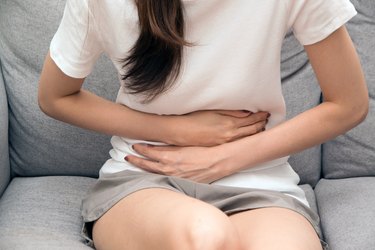
If you experience a stomachache instead of euphoria after working out, you're not alone. Stomach pain, cramping and nausea can occur during or after a workout, no matter your fitness level, age or gender.
Why the Pain?
Video of the Day
Usually the cause of pain and stomach upset is a benign issue that can be easily remedied. Sometimes, the remedy means changing lifestyle habits, like what you eat and when. Other times, though, you may need to alter your workout regimen to better accommodate an underlying health issue.
Video of the Day
Here are four scenarios that may explain what you're experiencing:
1. Exercise-related transient abdominal pain (ETAP). This is one of the most common causes pain in the abdomen that's related to exercise. You might think of it as a "stitch" — a jab or stab of pain that can occur during activity that involves moving the abdomen in a repeated motion from an extended position, like when you shoot baskets, run or row.
According to a study published in September 2014 in Sports Medicine, approximately one in five runners in an event will experience ETAP while running, but the exact cause for it is still a mystery. Avoiding large meals within one to two hours of exercise may help you avoid developing ETAP during your workout.
2. Eating before exercise. Another common cause of stomach discomfort or pain during and after a workout involves having eaten too much food too close to working out, making you feel sick to your stomach. However, eating the right foods in the right — that is, small — amount before your workout can be beneficial.
For instance, "you can eat a banana and peanut butter about 15 to 20 minutes prior or to working out," suggests Jaclyn Harhart, MSRD, a nutritionist in Simi Valley, California. "The combination of easily digestible simple carbs, fat and protein make it perfect fuel for a longer workout."
What you want to avoid is eating a large, heavy meal within a few hours of exercise. According to a study published in Sport in July 2019, there is no empirical data on how long to wait to exercise after a heavy meal but waiting one to two hours between eating and exercising seems to reduce the risk of nausea and stomach discomfort during exercise.
3. Intensity of your workout or activity. How hard you work out can directly affect how your stomach will feel during and after a workout. In fact, according to the Sport study, the intensity of your workout directly affects the likelihood that you will feel sick while working out or afterwards.
On the other hand, it notes, your level of physical fitness does not have a major impact on this feeling nor does it offer any kind of buffer. According to the study, marathoners who participated in hard practice runs or races were six times more likely to develop stomach nausea or pain during their workouts than during lower-intensity workouts.
4. Underlying conditions. If you're living with any type of gastrointestinal disease or condition, exercise may make your symptoms feel worse. This does not mean that you should not exercise. However, you may need to choose less intense forms of exercise and activities, such as walking, lifting light weights, biking or gardening, to name a few. You should stay away from longer, intense runs or high-intensity workouts.
According to the Canadian Society of Intestinal Research, there are a few underlying conditions that intense exercise can make worse, such as gastroesophageal reflux disease (GERD) and inflammatory bowel disease ((BD). If you're living with these conditions, talk with your doctor about your exercise goals. Your doctor should be able to recommend lifestyle changes that you can make that will help you reach them.
Read more: Pelvic Pain After Exercising
- Sports Medicine: “Exercise-Related Transient Abdominal Pain (ETAP)”
- Jaclyn Harhart, MSRD, nutritionist, Simi Valley, California
- Sport: “‘I think I’m Gonna Hurl’: A Narrative Review of the Causes of Nausea and Vomiting in Sport”
- Canadian Society of Intestinal Research, GI Society: “Physical Activity and GI Health”
Is this an emergency? If you are experiencing serious medical symptoms, please see the National Library of Medicine’s list of signs you need emergency medical attention or call 911.